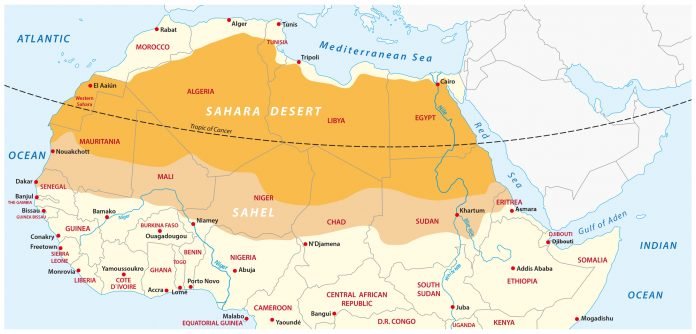Meet Amazon Mate, the Sahara Desert
It is no doubt that the Sahara in North Africa is the world’s largest non-polar desert. Often referred to as the Great Desert, most parts of the Sahara desert are believed to have been arable, habitable and flourishing with lives until seven million years ago when desert happened. Now, there are concerns about rapid rate of its expansion; an issue that has been blamed largely on harsh climatic changes and deforestation. But even in its dryness, Africa’s desert sends out enriched nutrients that ultimately benefit many areas around the world, and it’s now time to put value on these nutrients.

For many people, Sahara desert maybe synonymous with picturesque sand dunes, camel and desert safaris, but to the locals, the encroaching desert is a nightmare that has robbed them of their livelihood. Slightly over a decade ago, an initiative dubbed the Great Wall of Africa under the leadership of Nigerian ex-President, Olusegun Obasanjo, was started by the African Union to reclaim the desert, curb food scarcity and create jobs. This initiative involves planting drought resistant vegetation estimated to span across 13 countries namely Niger, Nigeria, Sudan, Southern Sudan, Ethiopia, Eritrea, Djibouti, Senegal, Mauritania, Mali, Burkina Faso and Chad. Most of these countries are known as Sahel countries. Senegal, Niger, Ethiopia, and Mali have made tremendous achievements in re-greening their dry land. Women have been at the forefront in embracing the initiative. One key behavioral change the project is activating is sensitizing the locals to actively participate in planting trees and other long-term sustainability efforts.
Sahara Desert is More than We Know-
But harsh and deprived as it is, the Sahara desert isn’t totally barren. It must release its dust for Amazon rainforest to be fruitful. Sahara Desert is the number one provider of nutrients to the Amazon rainforest travelling almost 10,000 miles across the ocean to feed the South American Amazon ecology. In fact, the curse upon some of the Sahel countries named above, Chad in particular, has been a rich blessing to most of northern South American countries like Brazil. According to NASA’s report, about 182 million tons of dust leave Sahara desert yearly to enrich Amazon basin. It was reported that the less rain in the region, the more dust it has to ship out through the Atlantic ocean to benefit Amazon rainforests.

Valuing Dust-
So should Sahel conduct an appraisal of its dust leaving for Amazon yearly and bill South America accordingly? Is this a valid value proposition? It’s difficult, but certainly not absurd. Brazil is boosting its economy 5 percent yearly mainly from Amazon riches – soybeans, coffee, sugar, and wood – earning roughly 10 billion dollars a year on its soybeans exports. Because of Sahara desert, Amazon rainforests produce rare herbs and plants for medicine which are vital to treating certain illnesses, and have become gains to many pharmaceutical corporations. Every country benefiting from the lush of Amazon forest including Peru, Colombia, and Bolivia as well as importers of all the goods from Amazon have stakes to protect in Sahel deserts.
When Sahel Wakes Up-
And when Sahel is conscious enough to fight for its own, it should seek the support of African Union and the United Nations to ensure that all bilateral and/or multilateral conversations around the unique value of its rich dust are held “shoulder -to-shoulder”, and not in form of aid. A significant portion of the existing aids flowing to the region should be diverted to its pressing climatic challenges and not necessarily toward weapons, food and cash. Tapping water from any water source in the region in addition to the tree planting initiative mentioned above would go a long way.
China Alternative-
Alternatively, China is already on Africa’s ground, and it’s desperate for future empire. Why not send them to work and have it explore water sources from either the Atlantic Ocean, the Nile River, or even the Red Sea to alleviate some of the challenges of Sahara one acre at a time. It is a fact that even if Africa is strong enough to alter Sahara desert, it’s efforts could impact other atmospheric conditions elsewhere. But if someone has to stay dry for another to stay fruitful, such interdependence ought to be duly recognized.
The Yin and Yang-
As the world enjoys all the yields of Amazon, and some give their best pitiable look at the world’s poorest from African region, let’s remember that we are interdependent as humans and that there is a yin yielding its dust in Africa for a Yang to happen elsewhere.



